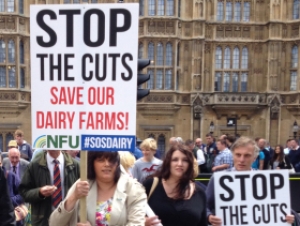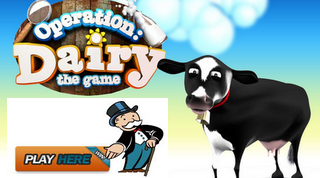Dairy farming

With price cuts and market volatility, as well as increasing costs of production threatening the UK dairy sector, the industry has pulled together and in two months achieved something never being seen before.
Last week, a voluntary code of best practice on contractual relationships between milk buyers and dairy farmers was agreed by the industry.
July saw three thousand dairy farmers attend an emergency summit in London, after major processors announced further price cuts.
Action then escalated, with normal, hard working dairy farmers peacefully protesting, demanding change and saying enough is enough.
Peaceful protests included demonstrations and blockades outside processing plants and retail stores.
Action outside supermarkets saw consumers get on side and the SOS Dairy campaign became a success story, explained Peter Kendall, President of the NFU.
"Whilst direct action played a huge role alongside the negotiations and talks, this campaign worked because it had society behind it and public support," he said.
The story hit national media, keeping it alive whilst difficult negotiations were taking place between industry, processors and retailers.
The sheer amount of farmers willing to show up to protests told the public that producers were fed up with the status quo. These events together gave out a strong message and made a compelling case, Mr Kendall said.
In the future, he hopes that the industry will continue to work together so there will be no need for protests.
Whilst not condoning direct action, Mr Paice, former Minister of Agriculture said, that had he being a dairy farmer himself he may have well joined the picket line.
What next?
With Arla announcing earlier this week that they would reverse the August milk price cut, many are asking what is next for the dairy coalition.
Whilst it has been successful in reversing planned August price cuts by retailers and processors, Spring price cuts are still in place.
Meurig Raymond, Deputy President of the NFU said that the objective of the coalition was to prevent price cuts and put a voluntary code of practice in place, which in turn would be a fair and functioning market place for the UK dairy industry. It was also to restore the May/ June price cuts, which is still on the agenda, he assured dairy farmers at Livestock 2012.
David Handley, Farmers for Action confirmed what Mr Raymond said. "We are on a role now and won't back down."
Voluntary code of practice
Whilst the voluntary code of practice will apply initially to those processors represented by Dairy UK, there is concern that some processors and retailers may completely ignore the code.
Who will lean on them to make sure they play a fair part?
Mr Kendall pointed out that this is addressed in the 10-point dairy plan, which will expose bad practice in the supply chain.
The coalition agreed that farmers must play their part in ensuring the voluntary code is a success. Mr Raymond said that farmers' must empower this change. Producers have the option to work with processors who are part of the code, it is their responsibility to make it work.
Part of the code includes a 12 month review, which will allow the industry to assess how successful the code has been.
The full details of the code are expected to be announced within the next month, it is currently being legally checked with the Office of Fair Trade.





















